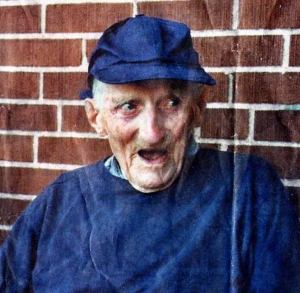|
From the Toronto Star Saturday, December 1, 2001.
Alec McDonald, who died last month at age 96, was a rare
breed in Ontario
By Rod McDonald
 ALEXANDRIA,
Ont. — In the quintessentially Celtic county called Glengarry, the death of
people in their 90s often brings the same refrain, whispered gently at the
funeral parlour: "There goes another of the old guard. There’s hardly any of
’em left." ALEXANDRIA,
Ont. — In the quintessentially Celtic county called Glengarry, the death of
people in their 90s often brings the same refrain, whispered gently at the
funeral parlour: "There goes another of the old guard. There’s hardly any of
’em left."
Another characteristic of this region is the extensive
nomenclature of nicknames. McDonalds are so common that colourful names are
necessary in order to figure out just whom people are talking about,
especially at weddings, highland games and funerals. My dad, for example, was
called Red Hughie. Other names that come to mind are John the Bighead, Johnny
Two-thumbs, Slippery Alex, Alex and a Half, Alex the Old Woman, Foghorn
McDonald and Protestant Duncan.
Alec McDonald, an inveterate bachelor, was known as Alec
From The Sixth or Turkey Alec.
It is well accepted in these
ports that Alec— born Dec. 9, 1904; died Nov. 7, 2001 —was the last true
Gaelic speaker around here and that people would even be hard-pressed to find
another like him in all of Ontario, if not Canada. Nobody seems to use Gaelic
as a mother tongue any more. Even back in the ‘50s, Alec was one of a very
few.
I was a pallbearer at his funeral. We walked through the
mud and driving rain in a rural graveyard in Lochiel, with the wind whistling
through the 100-year-old graves. As the piper played "Amazing Grace," I looked
down beside the coffin, and there, as if by magic, was a wind-beaten, dried-up
old Scottish thistle. lt was fitting.
On his
deathbed, Alec had leaned over to me and said: "Roddy,
all I ask is that someone talk to me in the Gaelic before I go. Then
I’ll be ready."
His was the one home in Kenyon
Township, north of Alexandria, where Gaelic was the only language spoken in
the house for five generations. It was considered close to treason to speak
English in the McDonald home. However, the local school board had seen fit to
forbid Gaelic, especially at the Kenyon School. where Alec and his brother
Donaldie went. Thus, they become bilingual at an early age.
But emotionally, Alec had chosen Gaelic over English. In
Ontario in the 20th century, while the language fought for its survival, Alec
spoke it with Donaldie (who died 15 years ago) and with anyone else he could:
teen tourists from Scotland, local enthusiasts (who had book-learned the
language but were far from fluent) and my father (who was fluent and who died
in 1987).
I still recall Alec arriving at
our front door in town, hollering at his beloved team of homes, bolting out of
a sleigh, ruddy cheeks glowing like apples, and saying, "Ciamara
How?" (How are you?), and my father answering something like "Mianach
Ma" (I’m fine, thanks). They shook hands, shuffled into the front room,
closed the door behind them and proceeded to have a long conversation in
Gaelic. I would snuggle up to the keyhole and eavesdrop on the guttural,
musical notes of the Gaelic, and their soft laughter. As the afternoon wore
on, I often noticed the odour of gin wafting under the old pine door, and lhe
voices grew louder.
On one occasion in 1992, the BBC Gaelic Service stopped in
Alexandria and asked if there were any Gaelic speakers. They motored out to
Alec’s boarding house, where they conversed with him in Gaelic all afternoon.
BBC Radio later broadcast the tape they had made of Alec speaking to them on
the Sixth Concession of Kenyon, Glengarry County.
Alec’s English was riddled with vestiges of Gaelic — what
with the rhythm to his speech and expressions he used. He said "Archiebishop"
instead of "Archbishop." His strangest oath, "Land a gotian," was really
"Atlantic Ocean," a reference to the rugged times the Scots had spent on ships
when immigrating to Canada.
Toward the end, I visited Alec
at an institution for the elderly. As he sat in his chair, humped over from
years of milking cows in a dark, dank stable, he spoke to me in a deep brogue
that betrayed his years of speaking "the Gaelic." He said he and Donaldie used
to speak Gaelic in the stable when they stumbled around with coal oil lanterns
in the dead of winter. And they relied on it when they gathered the fields of
hay with nothing more than a team of horses, some hay forks and the sweat of
their brows.
It had formed a great part of his culture and his soul, his
sensibilities and his poetry, and his desire to occupy the land with character
and determination, as so many of his Scottish forbears had done.
Perhaps Alec’s conflict with a society that did not
recognize his language and his innate need for continuity is symbolic of every
Canadian who Iabours to speak and safeguard a language that is precious to him
or her. Even if he were just 1 in 30 million and was forced to speak his
beloved Gaelic only in his dreams.
Alec is survived by many cousins in Glengarry County, all
of whom wished they, too, had learned the secretive, musical language that he
held so close to his heart. And they say, haltingly: "Beannachd-leat, Ellic."
(Farewell, Alec)
Rod McDonald, who lives in Alexandria, Ont., is a first
cousin once removed. A headstone for Alec is being planned, with the words
"last Gaelic speaker in Glengarry" carved into it. Next spring, there will be
a ceremony with Gaelic singing and readings at the gravesite in Lochiel.
Thanks to PK Murphy for sending this in |

